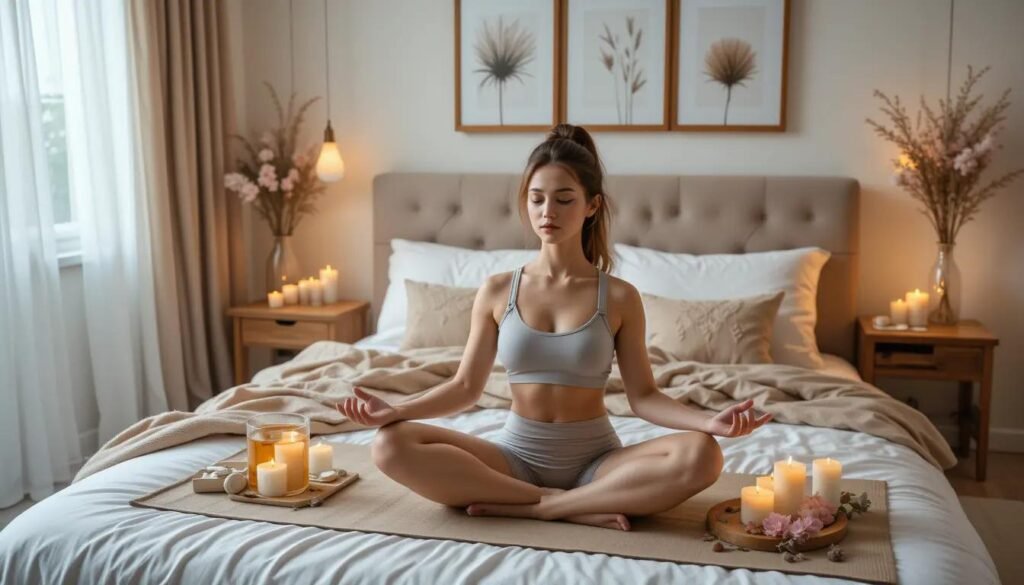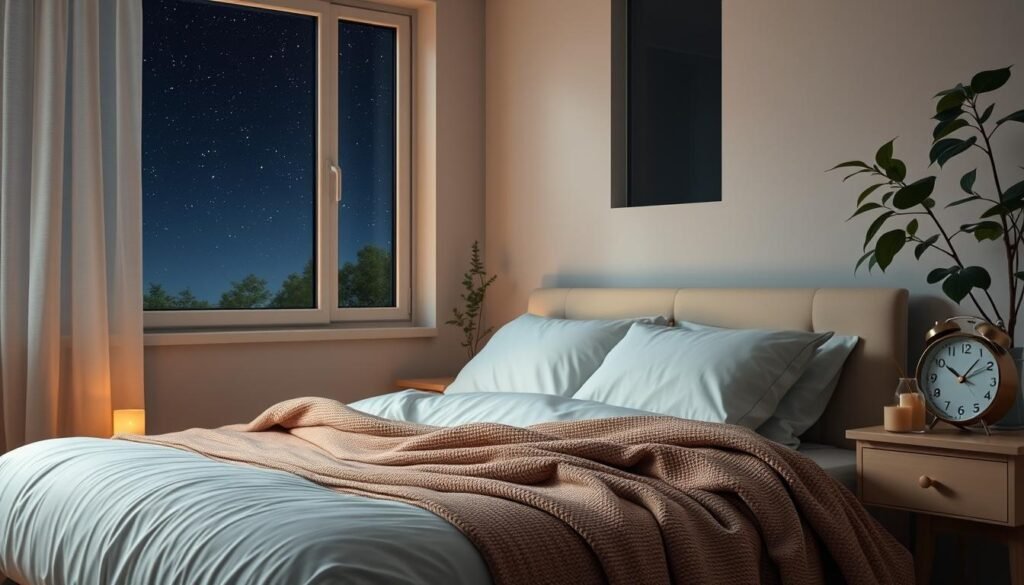Ever found yourself lying awake all night, hoping for a good night’s sleep? You’re not alone. Millions of people have trouble sleeping well, but it’s possible to change. Sleep is more than just resting your eyes; it’s about healing your body, mind, and spirit.
Good sleep is key to feeling your best. The National Library of Medicine says adults should sleep at least seven hours a night. But, over two-thirds of people have trouble sleeping, which can hurt their health and how well they do things.
Starting your journey to better sleep means seeing it as essential, not a luxury. By using smart sleep tips, you can make your sleep much better. This can change your life for the better.
Key Takeaways
- Aim for 7-8 hours of consistent sleep nightly
- Create a dedicated sleep environment
- Minimize electronic device use before bedtime
- Maintain a consistent sleep schedule
- Practice relaxation techniques to enhance sleep quality
- Monitor caffeine and alcohol intake
- Consider consulting a healthcare professional for persistent sleep issues
Understanding the Science Behind Quality Sleep
Sleep is more than just rest. It’s a complex process that’s key for your brain’s health and wellness. During sleep, your body goes through important changes that help you recover mentally and physically.
Your sleep patterns are controlled by two main systems: circadian rhythms and sleep drive. These systems work together to tell you when to be awake and when to sleep.
How Sleep Affects Brain Function and Recovery
While you sleep, your brain does important work. Studies show some amazing things about this process:
- Brain toxins are cleared during sleep cycles
- Memory consolidation happens in different sleep stages
- Creativity and problem-solving skills improve
“Sleep is the golden chain that binds health and our bodies together.” – Thomas Dekker
The Role of Circadian Rhythms
Your internal clock, or circadian rhythm, is key for good sleep. It responds to light and controls melatonin, the sleep hormone.
Sleep Cycles and Their Importance
A night’s sleep includes many sleep stages, each with its own role. Most people go through four to five complete cycles each night.
| Sleep Stage | Duration | Primary Function |
|---|---|---|
| Non-REM Stage 1 | 5-10 minutes | Light sleep transition |
| Non-REM Stage 2 | 20 minutes | Body temperature drops |
| Non-REM Stage 3 | 40-60 minutes | Deep, restorative sleep |
| REM Sleep | 10-60 minutes | Memory consolidation |
Knowing about these sleep cycles can help you sleep better and improve your overall sleep quality.
Creating the Optimal Sleep Environment
Making your bedroom a sleep sanctuary is key for better sleep. It should be a place that helps you relax and sleep well. This is a top tip for improving your sleep.
Creating the perfect sleep space is more than just a bed. It’s about planning for comfort and avoiding sleep breaks.
Temperature and Ventilation Control
Temperature affects how well you sleep. Studies say a room between 60 and 67 degrees Fahrenheit is best. Here are some tips for managing temperature:
- Use a programmable thermostat for steady cool temperatures
- Choose breathable, moisture-wicking bedding
- Opt for lightweight, layered blankets for easy temperature control
Light and Sound Management
“Darkness is the body’s natural signal for sleep preparation.” – Sleep Research Institute
Keep your room dark and quiet for better sleep. Many adults have trouble sleeping because of their environment. Here are some ways to improve:
- Install blackout curtains
- Use white noise machines
- Wear comfortable earplugs if needed
- Reduce blue light before bed
Choosing the Right Bedding and Mattress
Your mattress and bedding are important for sleep. Choose items that support your body and keep you cool.
- Opt for mattresses with medium-firm support
- Choose breathable, natural fabric sheets
- Replace mattresses every 7-10 years
Using these tips can greatly improve your sleep and overall health.
sleep health tips better sleep healthy sleep habits improve sleep quality sleep
Getting good sleep is more than just lying in bed. Healthy sleep habits can greatly improve your sleep quality. Studies show that 7 hours of sleep each night is key for health.
Your bedtime routine is very important for sleep. Here are some tips to help you sleep better:
- Maintain a consistent sleep schedule, even on weekends
- Create a relaxing pre-bedtime ritual
- Limit exposure to blue light from electronic devices
- Practice stress-reduction techniques
“Sleep is the golden chain that binds health and our bodies together.” – Thomas Dekker
Understanding your body’s natural rhythms is the first step in fighting insomnia. Getting at least 30 minutes of natural light a day helps regulate your sleep patterns.
Here are some key sleep tips:
- Keep bedroom temperature between 65-68 degrees Fahrenheit
- Use white noise or earplugs to minimize disruptions
- Invest in a comfortable, supportive mattress
- Practice deep breathing before bedtime
Pro tip: If you can’t fall asleep within 20 minutes, get up and do a calming activity until you feel sleepy.
By following these sleep health tips, you can change your nights for the better. Wake up feeling refreshed and full of energy.
Developing a Consistent Sleep Schedule
Keeping a regular sleep pattern is key to beating sleep deprivation and staying healthy. Your body likes routine, and a steady sleep schedule can greatly enhance your rest quality.
Most adults need 7-9 hours of sleep each night. A stable sleep routine helps your body’s clock stay in sync. It also lowers the chance of building up sleep debt.
Setting Fixed Sleep and Wake Times
Having the same bedtime and wake-up time is vital for good health. Here are some tips:
- Choose a bedtime that allows for 7-9 hours of sleep
- Set a fixed wake-up time, even on weekends
- Use alarm reminders to maintain your schedule
- Align sleep times with natural daylight cycles
Managing Weekend Sleep Patterns
Changing sleep times on weekends can mess with your body’s clock. Experts suggest:
- Limit sleep variation to no more than 1 hour
- Avoid sleeping in excessively
- Use relaxation techniques to manage weekend stress
Nap Guidelines and Best Practices
Smart napping can help with sleep issues without messing up your night sleep.
| Nap Duration | Best Time | Potential Benefits |
|---|---|---|
| 10-20 minutes | Early afternoon | Boosts alertness |
| 30 minutes | Before 3 PM | Improves cognitive function |
| Avoid long naps | After 3 PM | Prevents nighttime sleep disruption |
“Consistency is key in developing a healthy sleep routine that supports your mental and physical well-being.”
By focusing on a consistent sleep schedule, you improve your daily life. You’ll feel less stressed and be healthier overall.
Nutrition and Sleep: What to Eat and Drink
Your diet is key to better sleep and fighting sleep disorders. What you eat and drink affects how well you sleep and stay asleep.
“Let food be thy medicine and medicine be thy food” – Hippocrates
Studies show a strong link between what we eat and our sleep. A study found that eating more fruits and veggies can help sleep better and fight insomnia in young adults over three months.
Sleep-Promoting Foods
- Tart cherry juice
- Kiwi fruit
- Oily fish
- Poultry
- Milk and eggs
- Pumpkin seeds
Some supplements can help with sleep, but talk to a doctor before trying them. The Mediterranean diet, full of plants and seafood, is also good for sleep.
Foods to Avoid Before Bedtime
| Food/Drink | Sleep Impact |
|---|---|
| Caffeine | Disrupts sleep onset and quality |
| Alcohol | Fragments sleep stages |
| High-fat foods | Reduces sleep efficiency |
| Spicy foods | Can cause heartburn |
Eating a balanced diet with complex carbohydrates, moderate protein, and healthy fats helps sleep. Try to eat at regular times and avoid big meals before bed to keep your sleep cycles natural.
Pre-Bedtime Routines for Better Sleep
Having a regular pre-bedtime routine is key to better sleep. It helps manage sleep issues like sleep apnea. Your evening habits greatly affect how well you sleep.

Relaxation Techniques and Meditation
Relaxation techniques can change your sleep for the better. Deep breathing and progressive muscle relaxation help relax your body and mind.
- Practice deep breathing for 5-10 minutes before bed
- Try mindfulness meditation to calm racing thoughts
- Use guided imagery to promote mental relaxation
*”Meditation is not about stopping thoughts, but recognizing that you are more than your thoughts and your feelings.”* – Arianna Huffington
Digital Device Management
Electronic devices can mess up your sleep. The blue light from screens can make it hard to fall asleep.
| Device | Impact on Sleep | Recommended Action |
|---|---|---|
| Smartphone | High blue light emission | Stop use 1 hour before bedtime |
| Tablet | Disrupts circadian rhythm | Use night mode or blue light filter |
| Television | Stimulates brain activity | Avoid watching before sleep |
Evening Activity Guidelines
Your evening should be calm and relaxing. Choose activities that help you unwind and get ready for sleep.
- Read a book with soft lighting
- Practice gentle stretching
- Listen to soothing music
- Write in a journal to clear your mind
By following a consistent pre-bedtime routine, you can sleep better and lower your risk of sleep apnea. The goal is to smoothly transition from the day to a good night’s sleep.
Physical Activity and Its Impact on Sleep Quality
Physical activity is a key to better sleep. It’s one of the best ways to get a good night’s rest. Regular exercise can make a big difference in how well you sleep.
Studies show a strong link between exercise and sleep. People who exercise for at least 30 minutes a day sleep better. They often sleep 15 minutes longer than those who don’t exercise.
“Movement is medicine for sleep, and your body craves consistent physical activity,” says sleep experts.
When you exercise can also matter:
- Morning exercise helps regulate circadian rhythms
- Moderate aerobic activities increase slow-wave sleep
- Outdoor activities provide natural light exposure
- Light walking can contribute to better sleep patterns
It’s important to know how exercise affects sleep. Avoid vigorous workouts close to bedtime. They can keep you awake longer. Try to do intense exercises 1-2 hours before bed to relax.
Exercise does more than just make you sleep longer. It also helps your body make melatonin and keeps your body temperature right. For those who can’t sleep, exercise could be a big help.
Common Sleep Disruptors and How to Avoid Them
Sleep disorders can really hurt your health and happiness. It’s key to know and fix common sleep problems to keep your rest good and avoid needing insomnia remedies.

Caffeine and Alcohol’s Impact on Sleep
Caffeine stays in your body for up to 12 hours, messing with your sleep. It’s best to cut down on caffeine, maybe stop it by 2 PM. Alcohol might help you relax, but it messes with your sleep cycles.
- Avoid caffeine after 3 PM
- Limit alcohol before bedtime
- Try herbal tea in the evening instead
Stress Management Strategies
Stress is a big reason for sleep problems. Using good stress-reducing methods can make your sleep better.
- Try meditation for 15 minutes each day
- Write down your thoughts with journaling
- Think about seeing a therapist for stress
Environmental Sleep Disturbances
Your sleep space is very important for good rest. Too much noise, light, or bad bedding can really mess up your sleep.
| Disturbance | Solution |
|---|---|
| Noise | Use white noise machines or earplugs |
| Light | Install blackout curtains |
| Temperature | Keep the room at 60-67°F |
“Sleep is the golden chain that binds health and our bodies together.” – Thomas Dekker
For people working shifts or with odd hours, making a sleep-friendly space is even more important. Get blackout curtains and white noise machines to help meet your sleep needs.
Conclusion
Improving your sleep can greatly enhance your well-being. With 56% of Americans facing sleep issues, it’s key to know how to sleep better. Good sleep habits can boost your daily life and long-term health.
Sleep is essential, not a luxury. It affects every part of your life. Adults need at least seven hours of sleep each night. Keeping a regular sleep schedule is vital for good rest.
By focusing on sleep hygiene, you can avoid health problems like weight gain and blood sugar issues. If sleep issues persist, see a healthcare expert. Sleep disorders like insomnia and sleep apnea are common, affecting 31.6% of adults.
Improving your sleep is a journey. Begin with small steps, stay consistent, and value your rest. Your body and mind will appreciate the effort in getting quality sleep.




